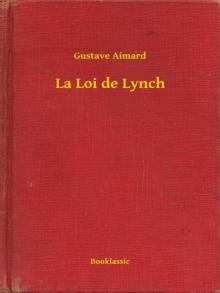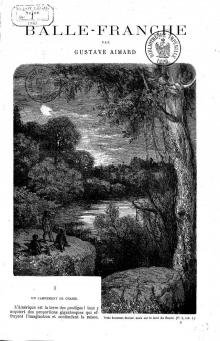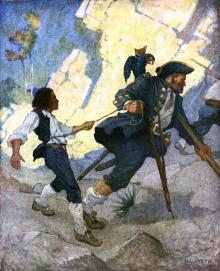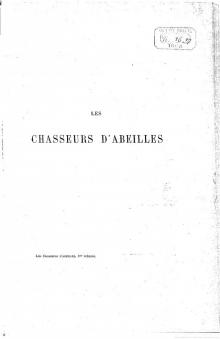- Home
- Gustave Aimard
Les fils de la tortue. English Page 8
Les fils de la tortue. English Read online
Page 8
CHAPTER VIII.
A VISIT TO THE CONVENT.
It was about five in the evening when Leon Delbes left the posada inthe company of Crevel. The great heat of midday had been succeeded bya refreshing sea breeze, which was beginning to rise and blow softly,producing an exquisite temperature, of which all took advantage torush from their houses, and join the numerous promenaders crowding thestreets, squares, and the shore of the ocean, whose calm and smoothsurface was tinged by the ardent beams of the sun, which had spenttwo-thirds of its course. It was a saint's day, and the people, dressedin their best clothes, whose varied colours offer the eye such apiquant effect, hurried along with shouts, song, and laughter, of whichno idea can be formed in Europe. In South America a holiday is theoccasion for all the pleasures which it is given to man to enjoy, andthe Americans do not neglect it. Marvellously endowed by nature, whichhas given them strength, vigour, and unalterable health, their powerfulorganization allows them to do anything. Born for love and pleasure,the South Americans make of their life one long enjoyment: it is theideal of refined sensualism.
The two Frenchmen, with their hats pulled over their eyes, andcarefully wrapped in their ponchos, so as not to be recognised anddelayed, mingled with the crowd, and elbowing and elbowed, pushingand pushed, they advanced as quickly as they could, moving with greatdifficulty through the mob that surrounded them.
The reader will be doubtless astonished to see, in a country so hot asChili, Leon Delbes and Crevel enveloped, as we have just said, in heavycloaks. In Chili, Peru, and generally in all the ex-Spanish colonies,the cloak is constantly in use, and almost indispensable! It is worneverywhere and always in all weathers and all places, at every hourof the night and of the day. There is a Spanish proverb which saysthat the cloak protects from heat and cold, from rain and sun. This istrue to a certain extent, but is not the sole reason why it has becomeobligatory.
The South Americans, as well as the descendants of the Spaniards, haveretained the two chief vices which distinguished their ancestors, thatis to say, a mad pride and invincible indolence. The American neverworks save when driven into his last entrenchments, when hunger forceshim to lay aside his careless and contemplative habits in order to earnmeans to support himself. Hence it follows very naturally, that it isimpossible for him to obtain the fine clothes which he covets, andwhose price is so heavy, that he despairs of ever possessing them.
In order to remedy this misfortune, and save, at the same time, hispride, which prohibits him from appearing badly dressed, he works justlong enough to save the money to buy himself a Panama hat, a pair oftrousers, and a cloak. When he has succeeded in obtaining these objectsof permanent necessity, he is all right and his honour is saved, forthanks to the exceptional talent which he possesses of draping himselfelegantly and majestically in a piece of cloth, he can boldly presenthimself anywhere, and no one will ever suspect what hideous rags andfrightful misery are covered by the splendid cloak which he bears onhis shoulders.
In addition to the motive which we have just explained, it is fair tostate that, owing to the excessive heat of the climate, the advantageof the cloak is felt in the fact that it is ample and wide, leavesthe limbs liberty of movement, and does not scorch the body, aswell-fitting clothes do when heated by the sunbeams. Hence rich andpoor have all adopted it.
After a ride interrupted at every moment by the people who encumberedthe streets, the two Frenchmen reached their destination, and stoppedbefore the church adjoining the convent. There they separated: Crevelproceeded toward the gate of the community, and Leon, after dismountingand fastening his horse to an iron ring fixed in the wall, entered thechurch, and leant against a pillar to wait.
The church of Nuestra Senora del Carmo, belonging to the Convent of thePurisima Concepcion, is one of the finest and richest of those existingin Valparaiso. It was built a short time after the conquest of Chili,in the Renaissance style. It is lofty, large, and well lighted by anumber of arched windows, whose coloured glass is among the finestspecimens of the art. A double row of columns delicately carved,supports a circular gallery, with a balcony in open work, made withthat patience which the Spaniards appear to have inherited from theArabs, and which produced the marvellous details of the great mosque ofCordova.
The choir is separated from the nave by a massive silver grating,modelled by some rival of Benvenuto Cellini. The high altar is of lapislazuli, and sixteen silver columns support a dome painted blue, andstudded! with gold stars, above the splendid table covered with a richpall of English point, on which stand the magnificent golden reliquarycontaining the Holy Sacrament.
In the aisles, eight chapels, placed under the protection of differentsaints, and adorned with, extraordinary wealth, each contains aconfessional which closes hermetically, and in which it is impossibleto catch a glimpse of the male or female penitent asking remissionof sins. Nothing can be imagined more aerial or coquettish than theebony pulpit, inlaid with mother-of-pearl, used by the preacher. Thispulpit is a masterpiece, and it is said that a Spanish workman, findinghimself in great danger, made a vow to Nuestra Senora del Carmen thathe would give her a pulpit if he escaped. Having escaped the danger,he devoted hourly years of his life to the accomplishment of the workhe had promised, and which he only completed a few months prior to hisdeath. If we may judge of the danger this man incurred by the finish ofthe execution and the merit of the work, it must have been immense.
Lastly, there are at regular distances large holy water vessels ofcarved marble, covered with plates of silver. When Leon entered thechurch it was full of faithful people. Upwards of two thousand candlesspread a dazzling light, and a cloud of incense brooded over thecongregation, who were plunged into a profound contemplation.
In American churches that impudent traffic in chairs, which goes on soshamelessly elsewhere during the holiest or more sorrowful ceremonies,is unknown. There are no seats, but the men stand, and the women bringwith them small square carpets on which they kneel. This custom mayperhaps injure the symmetry, but it certainly imparts to the assemblyof the faithful a more religious appearance. We do not see, as inFrance, individuals stretching themselves, taking their ease, throwingthemselves back, or sleeping in their chairs, and we are not at eachmovement disturbed by the rattling of wood upon the slabs.
On hearing the chants of the nuns, which rose in gentle and melodiousnotes, accompanied by the grave sound of the organ, Leon Delbes felthimself involuntarily assailed by a melancholy feeling. Graduallyforgetting the motive of his presence at this sacred spot, he let hishead fall upon his chest, and yielded entirely to the ecstasy intowhich the mighty harmony that filled his ears plunged him.
In the meanwhile Crevel, after leaving the captain of the smugglers,took a half turn and proceeded, as we said, toward the gate of theconvent, on which he knocked thrice, after looking around him ratherthrough habit than distrust, in order to make certain that he was notfollowed. The door was not opened, but a trap in the niche of theupper panel was pulled back, and an old woman's face appeared in theaperture. Crevel assumed his most sanctimonious look, and giving amighty bow, he said, as he doffed his broad-brimmed straw hat--
"Ave Maria Purisima, sister."
"Sin pecado concebida, brother," the old woman replied, who was noother than the sister porter, "what can I do for you?"
"I am ill, sister, very ill," Crevel repeated in a moaning voice.
"Good gracious, brother, what is the matter with you? But I am notmistaken," she added, after looking at the newcomer more attentively,"you are the worthy Frenchman established in the Calle San Agostino,who brings from time to time a few bottles of old French wine to theabbess for her cramp."
"Alas! yes, sister, it is myself; and I have brought two under mycloak, which I beg her to accept." Crevel, like a good many of hisfellow traders, had the praiseworthy habit of giving alms to the rich,in order to rob the poor with greater facility.
"They are welcome," said the sister porter, whose small eyes glistenedwith covetousness; "wait a
minute, brother, and I will open the gatefor you."
"Do so, sister, and I will wait as long as you please."
Crevel soon heard the formidable sound of bolts being drawn and locksturned, and at the end of a quarter of an hour the door was openedjust wide enough to leave passage for a man. The landlord glided likea snake through the opening offered him, and the door closed again atonce.
"Sit down, brother," said the sister porter; "it is a long way fromyour house to the convent."
"Thanks, sister," said Crevel, taking advantage of the invitation; "Iam really extremely tired."
He then took from under his poncho the two bottles, which he placed onthe table.
"Be good enough, sister," he said, "to give these bottles to yourMother Superior, begging her not to forget me in her prayers."
"I will not fail, brother, I assure you."
"I am certain of it, sister; and stay," he added, drawing out a thirdbottle, "take this, which I brought for you, and which will do yougood, for it is justly said in France that wine is the milk of agedpeople."
"That is true, brother, and I thank you; but tell me the nature of theillness you are suffering from."
"For some time past, sister, I have been subject to a sudden dizziness,and as your convent possesses a miraculous water which cures alldiseases, I have come to buy a phial."
"With the greatest pleasure, brother," the sister porter replied. "Iam sorry that I cannot make you a present of it; but this water isdeposited in my hands, and is the property of the poor, to whom wemust render an account of it."
We will remark parenthetically that the convents of Valparaisowillingly accept anything offered them, but never give anything away.Crevel was perfectly aware of this fact; hence, without offering theslightest observation, he drew four piastres from his pocket, which heplaced in the sister's hand. The latter put them out of sight with avivacity which astonished the banian himself: then running to a chestof drawers, the sole article of furniture which adorned the room, sheopened it and took a small white glass bottle, carefully corked andsealed, which lay there along with some sixty others, and brought it toCrevel.
The landlord received it with marks of profound gratitude.
"I hope that this water will do me good," he said, striving to prolongthe interview.
"Do not doubt it, brother."
And the sister porter looked at Crevel in a way which made himcomprehend that nothing need detain him now that he had what he came toseek. The banian understood it and prepared to rise.
"Now, sister, I will ask your permission to retire, in spite ofthe charm which your conversation has for me; but business beforeeverything."
"That is true," the sister porter replied; "hence I will not keep you;you know that you will always be welcome to the convent."
"Thanks, sister, thanks. And now I am off."
"Farewell, my brother."
He walked a few steps toward the door, but then hurriedly turned back.
"By the bye," he said, as if remembering something which he hadforgotten, "I trust that the accident which happened to one of yoursisters during the procession had no serious consequences."
"No, thanks to Heaven, brother."
"Ah, all the better; then she has quite recovered."
"So perfectly," said the sister porter, "that she is travelling at thismoment."
"What! the Senora Maria de Soto-Mayor travelling?"
"You know her name?"
"Of course; for I was formerly butler to the general her father."
"Well, then, it was through an order of the general that Sister Marialeft this morning for the country house which he possesses a fewleagues from here."
"Well, then, sister, good-bye, and I hope we shall meet again soon,"Crevel exclaimed, hurrying this time to reach the gate.
"iAnda Ve con Dios!" said the sister, surprised at this hurriedmovement.
"Thanks, thanks."
Crevel was already in the street.
Now, while he was conscientiously performing the commission which Leonhad entrusted to him, the latter was still waiting for Crevel to rejoinhim. After remaining a quarter of an hour in the church, he left it,and was beginning to grow impatient, when the landlord's shadow wasthrown on the convent wall.
In a second he was by his side.
"Well?" he asked, on approaching him.
"Come, come," said Crevel, with satisfaction, "I fancy I bring goodnews."
"Speak at once."
"In the first place, Dona Maria is perfectly well, and feels no effectsfrom the terror which your horse caused her."
"Next?"
"That is something, surely."
"Go on, go on! scoundrel," the smuggler cried, as he shook Crevel's arm.
"Good heavens! a little calmness, Senor Caballero; you will nevercorrect yourself of your vivacity."
Leon's brows were contracted, and he stamped his foot passionately, soCrevel hastened to obey.
"Learn, then, that this morning the young lady left the convent torejoin her family."
"What do you say?" Leon asked, utterly astounded.
"The truth; for the sister porter assures me of the fact."
"In that case, I am off, too."
"Why?"
"What would you have me do here?"
And, not troubling himself further about his companion, the captainunfastened his horse and leaped on its back. Then, throwing his purseto the landlord, he said that he should see him again soon, and startedat a gallop.
"Hum!" Crevel said, quite confounded; "the devil's certainly in thatfellow, or he has a slate loose. What a pace he rides at!"
And, after giving a last glance at the rider, who was disappearinground the corner of the square, the worthy landlord quietly bent hissteps in the direction of his posada.
"For all that, he is a good customer."

 La loi de lynch. English
La loi de lynch. English The Guide of the Desert
The Guide of the Desert The Trail-Hunter: A Tale of the Far West
The Trail-Hunter: A Tale of the Far West The Pirates of the Prairies: Adventures in the American Desert
The Pirates of the Prairies: Adventures in the American Desert The Treasure of Pearls: A Romance of Adventures in California
The Treasure of Pearls: A Romance of Adventures in California Les outlaws du Missouri. English
Les outlaws du Missouri. English Les trappeurs de l'Arkansas. English
Les trappeurs de l'Arkansas. English The Border Rifles: A Tale of the Texan War
The Border Rifles: A Tale of the Texan War Balle-Franche. English
Balle-Franche. English The Queen of the Savannah: A Story of the Mexican War
The Queen of the Savannah: A Story of the Mexican War The Red Track: A Story of Social Life in Mexico
The Red Track: A Story of Social Life in Mexico La fièvre d'or. English
La fièvre d'or. English The Pearl of the Andes: A Tale of Love and Adventure
The Pearl of the Andes: A Tale of Love and Adventure Les fils de la tortue. English
Les fils de la tortue. English The Indian Chief: The Story of a Revolution
The Indian Chief: The Story of a Revolution Les chasseurs d'abeilles. English
Les chasseurs d'abeilles. English The Adventurers
The Adventurers